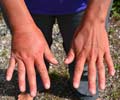A recent study has found that a treatment combined with acupressure, a slight change in day-to-day activities and the use of adaptive devises may help alleviate chronic pain.
A recent study has found that a treatment combined with acupressure, a slight change in day-to-day activities and the use of adaptive devises may help alleviate chronic pain.
A University of Missouri-Columbia occupational therapy professor suggests that the above-mentioned complementary medications could prove more effective in treating the condition, than the conventional medicines.Some of the medications for the syndrome have side effects that make it difficult for patients to perform their everyday jobs.
However, Guy McCormack, chair of the Department of Occupational Therapy and Occupational Science in the MU School of Health Professions, with the help of a case study, has demonstrated that some modifications in performing daily activities and use of certain adaptive devices can help reduce the perception of pain, and hence provide relief to the patient.
To test his theory, McCormack picked up the case study of his chronic back pain patient Mr. Jones, who could not sleep, bend or stand for long periods of time and couldn’t lose weight because the pain kept him from exercising.
McCormack treated Jones with acupressure, modifications in performing daily activities and adaptive devices, such as a long handle reacher that allowed him to put on socks without bending over.
Within one month, Jones was able to get through the day with improved performance, better sleep and less pain medication. He also was taught how to do modified exercises, yoga and use lumbar support while driving and sleeping.
Advertisement
He added that modifications, such as teaching better body mechanics, finding ways to simplify daily activities and use of assistive devices are all important ways to help with chronic pain. Relaxation techniques, breathing techniques, imagery and visualization can all help with how patients perceive pain.
Advertisement
He further explained that complementary therapies also can be used to alleviate side effects from medications, such as chemotherapy. Patients with terminal illnesses may need to be taught relaxation techniques or be given special emotional support to take their minds off what is happening, he said.
“Complementary practices do not compete with conventional medicine whereas alternative medicine might. Acupuncture, chiropractic care, Indian or eastern medicine are considered alternative medicine and are less accepted by the conventional medical community. Doctors are more accepting of other methods if it complements what they are doing,” McCormack said.
The study was recently published in OT Practice, a journal of The American Occupational Therapy Association.
Source-ANI
GAN /J








